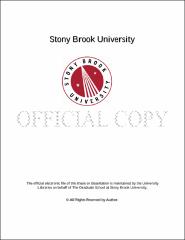| dc.identifier.uri | http://hdl.handle.net/11401/76524 | |
| dc.description.sponsorship | This work is sponsored by the Stony Brook University Graduate School in compliance with the requirements for completion of degree. | en_US |
| dc.format | Monograph | |
| dc.format.medium | Electronic Resource | en_US |
| dc.language.iso | en_US | |
| dc.publisher | The Graduate School, Stony Brook University: Stony Brook, NY. | |
| dc.type | Dissertation | |
| dcterms.abstract | Non-steroidal anti-inflammatory drugs (NSAIDs) are frequently used to treat various inflammatory diseases. In particular, the NSAID naproxen is a major first-line treatment for rheumatoid arthritis, an inflammatory disease affecting 1% of the population worldwide. The potential use of NSAIDs also spans to other debilitating and chronic diseases, including cancer. Epidemiological studies have shown that the use of naproxen significantly correlates with a lower risk of colon cancer, the third most common type of cancer in the United States. Although conventional naproxen can subdue arthritic inflammation and reduce the risk of developing colon cancer, its long-term use is associated with significant side effects, including gastrointestinal toxicity, which limit its potential to effectively control these chronic diseases. To overcome this limitation and potentially increase its efficacy, we have developed phospho-naproxen (P-N), a novel naproxen derivative. The objective of this work was to determine the efficacy, safety, and potential mechanism of action of P-N in two clinically relevant models, rheumatoid arthritis and colon cancer. In an adjuvant rat model of rheumatoid arthritis, P-N proved to be more efficacious than its parent compound. P-N exhibited a 60% (p<0.001) enhanced safety over naproxen. In addition, P-N also significantly reduced rheumatoid arthritis inflammation, inflammatory cell infiltration, bone resorption, cartilage damage, pro-inflammatory cytokine (IL-1β and IL-6) levels, cycloxygenase-2 expression, and NF-κ B levels. P-N was also effective in preventing colon cancer in APCMin/+ mice. P-N prevented the development of intestinal tumors up to 99% (p<0.001) in a dose-dependent manner compared to vehicle-treated control. Furthermore, P-N exhibited significantly enhanced potency over naproxen in reducing cell growth of various colon cancer cell lines in vitro by inhibiting cellular proliferation, blocking the cell cycle at G1/S, and inducing apoptosis. Mechanistically, P-N inhibits NF-κ B activity in colon cancer cells in a concentration-dependent manner. In conclusion, the novel drug, P-N, is a promising candidate agent for rheumatoid arthritis therapy and colon cancer chemoprevention, satisfying two essential parameters for a drug given chronically: efficacy and safety. | |
| dcterms.available | 2017-09-20T16:50:33Z | |
| dcterms.contributor | Rigas, Basil | en_US |
| dcterms.contributor | Prives, Joav | en_US |
| dcterms.contributor | Demple, Bruce | en_US |
| dcterms.contributor | Williams, Jennie. | en_US |
| dcterms.creator | Patel, Vinal | |
| dcterms.dateAccepted | 2017-09-20T16:50:33Z | |
| dcterms.dateSubmitted | 2017-09-20T16:50:33Z | |
| dcterms.description | Department of Molecular and Cellular Pharmacology. | en_US |
| dcterms.extent | 166 pg. | en_US |
| dcterms.format | Application/PDF | en_US |
| dcterms.format | Monograph | |
| dcterms.identifier | http://hdl.handle.net/11401/76524 | |
| dcterms.issued | 2015-08-01 | |
| dcterms.language | en_US | |
| dcterms.provenance | Made available in DSpace on 2017-09-20T16:50:33Z (GMT). No. of bitstreams: 1
Patel_grad.sunysb_0771E_11908.pdf: 3496100 bytes, checksum: 47e214a80cb07e81817fdec6bdc62d15 (MD5)
Previous issue date: 2014 | en |
| dcterms.publisher | The Graduate School, Stony Brook University: Stony Brook, NY. | |
| dcterms.subject | Arthritis, Chemoprevention, Colon Cancer, NSAID, Treatment | |
| dcterms.subject | Pharmaceutical sciences | |
| dcterms.title | PHOSPHO-NAPROXEN: A NOVEL AGENT FOR THE CONTROL OF ARTHRITIS AND COLON CANCER | |
| dcterms.type | Dissertation | |

